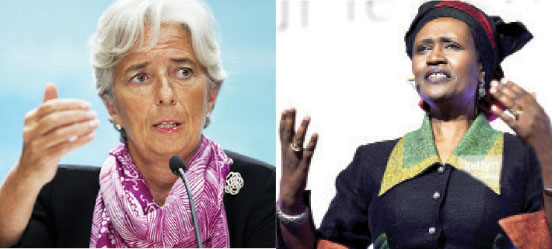By Kelechi Mgboji
Assistant Business Editor
International organisations are beginning to appreciate the importance of taxation, with recent revelations about tax havens, falling commodities prices, and decline in development efforts by African countries.
For the first time in history, the International Monetary Fund (IMF), Organisation for Economic Co-operation and Development (OECD), United Nations and the World Bank Group have taken major steps to boost cooperation to implement tax matters globally.
Announcing the development last week after a meeting of the World Bank, IMF and development partners, the international group said the platform will help achieve UN Sustainable Development Goals (SDGs).
“A major aim of the Platform is to better frame technical advice to developing countries as they seek both more capacity support and greater influence in designing international rules,” it explained.
One of the Platform’s first tasks will be to deliver a number of tool-kits designed to help developing countries implement the measures devised under the G20/OECD Base Erosion and Profit Shifting Project (BEPS) and on other international tax issues.
The four international organisations expressed hope that the scheme will also strengthen their capacity building support, deliver jointly developed guidance, and ensure information sharing on operational and knowledge activities.
Platform members will hold regular meetings with representatives of developing countries, regional tax organisations as well as banks and donors.
Consultations with business and civil society organisations would be organised as needed.
Commodity slump pushes Africa back into IMF’s embrace
With depressed prices for commodities ranging from oil to copper sapping the budgets of African governments, most countries on the continent are facing revenue crisis pushing them closer to loan deals with the IMF and other international financing institutions.
Top on the list is Angola, Africa’s second biggest crude producer and third largest economy.
Reuters reported that Angola has not borrowed from the IMF since 2009 but last week resumed talks with IMF for loans.
Nigeria, Africa’s largest economy, has just sealed a $6 billion loan deal with the Chinese government for infrastructure financing.
But Africa’s top oil producer, whose some of its politicians and public officers are reeking in multiple fraud cases, may also seek assistance from the IMF for the first time in almost two decades, even when many have advised against it.
Like Angola, during recent oil boom with oil fetching over $100 a barrel, Nigeria kept away from the lender of last resort but may soon go to the IMF which typically imposes tough conditions for assistance.
According to Reuters, gold and oil producer Ghana had a three-year, $918 million assistance deal signed as its fiscal and current account deficits ballooned.
Gas-rich Mozambique, Africa’s second-largest copper producer, Zambia, and many others are seeking loans or about to sign loan deals having being hard hit by the sour commodity cycle.
Shocking Panama Papers
But while the emerging economies of Africa and other developing countries struggle with a sharp fall in revenue earnings, some of their political office holders and business owners are defrauding public treasuries.
Recently, 11.5 million confidential documents detailed information about more than 214,000 offshore companies compiled by the Panamanian corporate service provider, Mossack Fonseca, including the identities of company shareholders and directors.
The documents revealed how wealthy individuals, including public officials, hide assets from public scrutiny.
At the time of publication, the papers identified five then-heads of state or government leaders from Argentina, Iceland, Saudi Arabia, Ukraine, and the United Arab Emirates as well as government officials, close relatives, and close associates of various heads of government of more than 40 other countries, including Nigeria.
The British Virgin Islands was home to half of the companies exposed and Hong Kong contained the most affiliated banks, law firms, and middlemen.
While the use of offshore business entities is not illegal in the jurisdictions in which they are registered, during their investigation journalists found that some of the shell corporations may have been used for illegal purposes, including fraud, drug trafficking, and tax evasion.
German newspaper Suddeutsche Zeitung which obtained the documents early 2015, enlisted the help of International Consortium of Investigative Journalists (ICIJ), which distributed the documents for investigation and analysis to some 400 journalists at 107 media organisations in 76 countries, including Nigeria’s online news medium, Premium Times.
Some Nigerians have been mentioned in the scandalous acquisition of wealth at the expense of the poor masses.
The ICIJ plans to publish a full list of companies involved in May 2016.
Efficient taxation as a way out
The failure of many developing countries to strengthen tax administration to stall tax avoidance is what enables the rich and big corporations to avoid taxation while the poor are left to pay more taxes.
This was the submission of a panel of discussants on the Future of International Taxation at the World Bank/IMF Spring Meetings in Washington DC last week.
The panel comprising IMF Managing Director, Christine Lagarde, and many representatives of governments, agencies and corporate organisations and institutions, advised governments to evolve fair international tax systems to guard against the poor being continually shortchanged.
Executive Director of Oxfam International, Winnie Byanyima, said: “Because developing countries are not able to raise all the domestic revenues they could raise, due to the leaking system, they are forced to do two things:
“First, taxing regressively, with many developing countries relying more and more on consumption taxes, which passes the burden of taxation from rich companies to the poorest people, particularly women; and
“Second, cutting public spending, including health, education, social protection.”
To offset the loss of revenues from multinational companies’ tax avoidance, she said developing countries are forced to implement policies that will prevent them from achieving SDGs.
Byanyima also noted that in a globalised world, it is more difficult to tax capital, partly due to the complexity of tax systems that make it easy to avoid taxes for multinational corporations and wealthy individuals.
At the moment, she added, the benefits of globalisation are not distributed in a fair way, and higher taxes on multinational corporate profits could be a way to address the issue.
Lagarde stressed that developing countries suffer the most from the “optimisation of tax schemes” put in place by large corporations, as developing economies are the ones which rely relatively more (in percentage of GDP) on corporate taxes.
She said trading has changed in the last decades, with a larger share of intangible goods exchanged in the world economy, which facilitates the allocation of value to the most favourable tax sovereign in order to reduce the overall tax rate of a company.
The panel argued that “it is only a fair international tax system that gives the poorest countries the maximum opportunities to raise domestic revenues to meet the Sustainable Development Goals (SDGs).”













